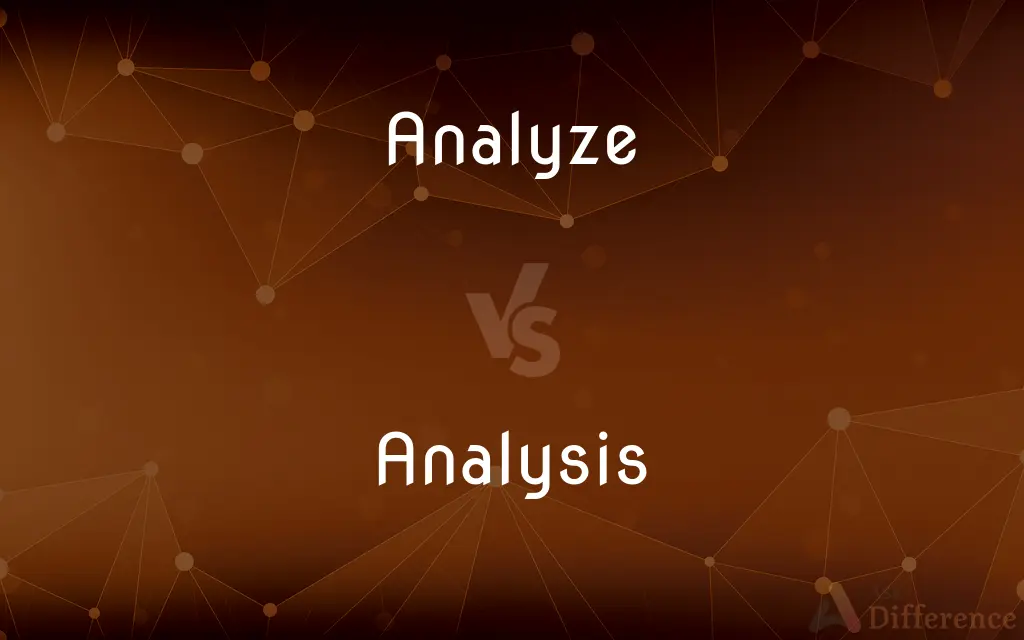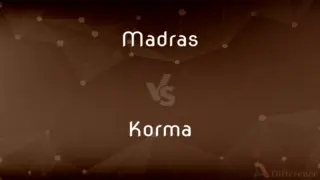Analyze vs. Analysis — What's the Difference?
By Urooj Arif & Maham Liaqat — Updated on March 18, 2024
"Analyze" is a verb meaning to examine in detail, while "analysis" is a noun referring to the process or result of analyzing.

Difference Between Analyze and Analysis
Table of Contents
ADVERTISEMENT
Key Differences
Analyze represents the action of examining something methodically to understand it better or to break it down into its constituent elements. On the other hand, analysis refers to the systematic examination itself or the findings from such an examination. When you analyze something, you're engaging in the process of scrutiny and evaluation, which leads to an analysis that encapsulates your observations, conclusions, or the methodical breakdown of the subject at hand.
The act of analyzing can occur in various fields such as science, literature, or business, where it involves dissecting information, data, or texts to uncover underlying patterns, relationships, or meanings. Conversely, an analysis can be documented as a report, study, or critique, presenting the insights gained from this in-depth examination.
Analyzing is a dynamic process that requires active engagement with the material or data, employing specific methodologies or theories to guide the examination. Analysis, as the culmination of this process, stands as a static entity a document, framework, or set of conclusions that synthesizes and presents the findings.
In the workflow of research or study, the verb "analyze" signifies the operational phase where data is being processed or interrogated, whereas "analysis" often marks the conclusion or output phase, where the results of the analysis are compiled and shared.
The distinction between analyze and analysis highlights the fundamental relationship between action and outcome in intellectual, scientific, and practical inquiries, emphasizing the transition from the procedural to the conclusive.
ADVERTISEMENT
Comparison Chart
Part of Speech
Verb
Noun
Definition
To examine something methodically.
The process or result of examining methodically.
Application
Involves actively breaking down information.
The conclusions or breakdown derived from the examination.
Context
Used when describing the act of examination.
Used to refer to the findings or the process as a whole.
Outcome
The process of analyzing.
The product or conclusion of the analyzing process.
Compare with Definitions
Analyze
Involves critical thinking.
The critic will analyze the film's narrative structure.
Analysis
Reflects insights or findings.
Her literary analysis unveiled the themes of the novel.
Analyze
To examine in detail.
Scientists analyze data to draw conclusions.
Analysis
Detailed examination.
The analysis of the experiment was published in a journal.
Analyze
Active process.
To solve the problem, we must first analyze the factors involved.
Analysis
Can be a document or report.
The market analysis shows a trend towards eco-friendly products.
Analyze
Can lead to various outcomes.
Analyzing the survey results can reveal customer preferences.
Analysis
Static representation.
The analysis remains a key reference in the field.
Analyze
Method-specific.
Psychologists analyze behavior using various theories.
Analysis
Outcome of analyzing.
The final analysis confirmed the initial hypothesis.
Analyze
To examine methodically by separating into parts and studying their interrelations.
Analysis
Analysis is the process of breaking a complex topic or substance into smaller parts in order to gain a better understanding of it. The technique has been applied in the study of mathematics and logic since before Aristotle (384–322 B.C.), though analysis as a formal concept is a relatively recent development.The word comes from the Ancient Greek ἀνάλυσις (analysis, "a breaking-up" or "an untying;" from ana- "up, throughout" and lysis "a loosening").
Analyze
(Chemistry) To make a chemical analysis of.
Analysis
Detailed examination of the elements or structure of something
Statistical analysis
An analysis of popular culture
Analyze
(Mathematics) To make a mathematical analysis of.
Analysis
Short for psychoanalysis
Other schools of analysis have evolved out of the original disciplines established by Freud
Analyze
To psychoanalyze.
Analysis
The separation of an intellectual or material whole into its constituent parts for individual study.
Analyze
(transitive) To subject to analysis.
Analysis
The study of such constituent parts and their interrelationships in making up a whole.
Analyze
(transitive) To resolve (anything complex) into its elements.
Analysis
A spoken or written presentation of such study
Published an analysis of poetic meter.
Analyze
(transitive) To separate into the constituent parts, for the purpose of an examination of each separately.
Analysis
The separation of a substance into its constituent elements to determine either their nature (qualitative analysis) or their proportions (quantitative analysis).
Analyze
(transitive) To examine in such a manner as to ascertain the elements or nature of the thing examined; as, to analyze a fossil substance, to analyze a sentence or a word, or to analyze an action to ascertain its morality.
Analysis
The stated findings of such a separation or determination.
Analyze
To subject to analysis; to resolve (anything complex) into its elements; to separate into the constituent parts, for the purpose of an examination of each separately; to examine in such a manner as to ascertain the elements or nature of the thing examined; to consider in detail in order to discover essential features or meaning; as, to analyze an action to ascertain its morality; to analyse a sonnet by Shakespeare; to analyse the evidence in a criminal trial; to analyse your real motives.
No one, I presume, can analyze the sensations of pleasure or pain.
Analysis
A branch of mathematics principally involving differential and integral calculus, sequences, and series and concerned with limits and convergence.
Analyze
Make a mathematical, chemical, or grammatical analysis of; break down into components or essential features; as, to analyse a specimen; to analyze a fossil substance; to analyze a sentence or a word; to analyse a chemical compound.
Analysis
The method of proof in which a known truth is sought as a consequence of a series of deductions from that which is the thing to be proved.
Analyze
Subject to psychoanalytic treatment.
Analysis
(Linguistics) The use of function words such as prepositions, pronouns, or auxiliary verbs instead of inflectional endings to express a grammatical relationship; for example, the cover of the dictionary instead of the dictionary's cover.
Analyze
Consider in detail and subject to an analysis in order to discover essential features or meaning;
Analyze a sonnet by Shakespeare
Analyze the evidence in a criminal trial
Analyze your real motives
Analysis
Psychoanalysis.
Analyze
Make a mathematical, chemical, or grammatical analysis of; break down into components or essential features;
Analyze a specimen
Analyze a sentence
Analyze a chemical compound
Analysis
Systems analysis.
Analyze
Break down into components or essential features;
Analyze today's financial market
Analysis
(countable) Decomposition into components in order to study (a complex thing, concept, theory etc.).
Analyze
Subject to psychoanalytic treatment;
I was analyzed in Vienna by a famous psychiatrist
Analysis
(countable) The result of such a process.
Analysis
The mathematical study of functions, sequences, series, limits, derivatives and integrals.
Mathematical analysis
Analysis
Proof by deduction from known truths.
Analysis
The process of breaking down a substance into its constituent parts, or the result of this process.
Analysis
The analytical study of melodies, harmonies, sequences, repetitions, variations, quotations, juxtapositions, and surprises.
Analysis
Psychoanalysis.
Analysis
A resolution of anything, whether an object of the senses or of the intellect, into its constituent or original elements; an examination of the component parts of a subject, each separately, as the words which compose a sentence, the tones of a tune, or the simple propositions which enter into an argument. It is opposed to synthesis.
Analysis
The separation of a compound substance, by chemical processes, into its constituents, with a view to ascertain either (a) what elements it contains, or (b) how much of each element is present. The former is called qualitative, and the latter quantitative analysis.
Analysis
The tracing of things to their source, and the resolving of knowledge into its original principles.
Analysis
The resolving of problems by reducing the conditions that are in them to equations.
Analysis
A syllabus, or table of the principal heads of a discourse, disposed in their natural order.
Analysis
The process of ascertaining the name of a species, or its place in a system of classification, by means of an analytical table or key.
Analysis
An investigation of the component parts of a whole and their relations in making up the whole
Analysis
The abstract separation of a whole into its constituent parts in order to study the parts and their relations
Analysis
A form of literary criticism in which the structure of a piece of writing is analyzed
Analysis
The use of closed-class words instead of inflections: e.g., `the father of the bride' instead of `the bride's father'
Analysis
A branch of mathematics involving calculus and the theory of limits; sequences and series and integration and differentiation
Analysis
A set of techniques for exploring underlying motives and a method of treating various mental disorders; based on the theories of Sigmund Freud;
His physician recommended psychoanalysis
Common Curiosities
What does it mean to analyze something?
Analyzing something means methodically examining it to understand its components, purpose, or relationships within it.
What is an analysis?
An analysis is either the process of examining something in detail to understand it better or the conclusions drawn from such an examination.
How do analyze and analysis relate to each other?
"Analyze" is the act of conducting an examination, while "analysis" is the result or documentation of that examination.
Why is it important to differentiate between analyze and analysis?
Differentiating between the two helps clarify whether you're referring to the act of examining (analyze) or the outcome of that examination (analysis).
Is analyzing always a scientific process?
While analyzing often employs methodical and scientific approaches, it can also be applied in less formal contexts, such as art criticism or personal decision-making.
Can analysis be both the process and the result?
Yes, analysis can refer to both the systematic examination itself and the findings or conclusions derived from that process.
In what fields are analyze and analysis commonly used?
They are used across various fields, including but not limited to science, literature, business, and psychology, wherever detailed examination is required.
How do you present an analysis?
An analysis is typically presented through written reports, essays, presentations, or discussions, depending on the context and audience.
Can you use analyze and analysis interchangeably?
No, due to their different parts of speech and meanings, they are not interchangeable but are related in the context of examination and findings.
What skills are important for analyzing information?
Critical thinking, attention to detail, methodological knowledge, and the ability to synthesize information are crucial for analyzing.
Share Your Discovery

Previous Comparison
Swat vs. Fbi
Next Comparison
Madras vs. KormaAuthor Spotlight
Written by
Urooj ArifUrooj is a skilled content writer at Ask Difference, known for her exceptional ability to simplify complex topics into engaging and informative content. With a passion for research and a flair for clear, concise writing, she consistently delivers articles that resonate with our diverse audience.
Co-written by
Maham Liaqat













































